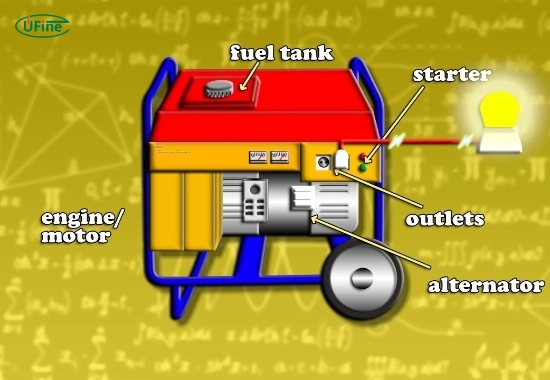In an age where power outages can disrupt daily life, a battery-operated generator has become essential for many households and businesses. These generators provide a reliable backup power source without the noise and emissions associated with traditional gas generators. This guide will explore what battery-operated generators are, how they work, their advantages and disadvantages, and their applications.
Part 1. What is a battery operated generator?
A battery operated generator is a device that stores electrical energy in batteries and converts it into usable power. Unlike traditional generators that run on gasoline or diesel, battery-operated generators utilize rechargeable batteries. This makes them a cleaner and quieter alternative for generating electricity.
People often refer to these devices as portable power stations or battery generators. Manufacturers design them to provide electricity during power outages or off-grid situations, making them ideal for camping, tailgating, and emergency preparedness.
Part 2. How does a battery operated generator work?
Battery-operated generators store electrical energy in batteries, which users can charge from various sources.
- Wall outlets: The most common way to charge the batteries is by plugging the generator into a standard electrical outlet.
- Solar panels: Many modern battery generators come with solar charging capabilities, allowing users to harness solar energy for recharging.
- Wind turbines: Users can also charge some systems using wind energy, providing an additional renewable option.
When needed, the generator converts the stored DC (direct current) from the batteries into AC (alternating current) electricity through an inverter. This allows users to power household appliances and electronic devices.
Part 3. Advantages of battery operated generators
Battery-operated generators offer several benefits over traditional fuel-powered generators:
- Quiet operation: These generators operate silently, making them suitable for residential areas and camping trips where noise can be disruptive.
- No emissions: Battery generators produce zero emissions during operation, making them environmentally friendly.
- Low maintenance: Unlike gas-powered generators, which require regular maintenance, such as oil changes and fuel stabilization, battery-operated models require minimal upkeep.
- Portability: Many battery-operated generators are lightweight and designed for easy transport, allowing users to take them on outdoor adventures or move them around the home as needed.
- Immediate power supply: They can provide instant power when needed without the delay associated with starting a gas generator.
Part 4. Disadvantages of battery operated generators
While battery-operated generators have many advantages, they also come with some drawbacks:
- Limited runtime: The battery capacity determines the electricity they can provide. Once depleted, users need to recharge them before using them again.
- Initial cost: The upfront cost of purchasing a quality battery generator can be higher than that of traditional gas generators.
- Charging time: Depending on the model and charging method, recharging a battery generator can take several hours.
Part 5. Key features to consider when choosing a battery operated generator
When selecting a battery-operated generator, consider the following features:
- Battery capacity: Measured in watt-hours (Wh), this indicates the energy the generator can store. Higher capacity means longer runtime.
- Power output: Look for continuous and peak wattage ratings to ensure it can handle your essential appliances.
- Ports and connectivity options: Ensure it has enough AC outlets, USB ports, and DC outputs to meet your needs.
- Weight and portability: If you plan to use it for camping or travel, consider its weight and design for ease of transport.
- Recharge options: Models with multiple charging options (solar, wall outlet) offer more flexibility in keeping them powered.
Part 6. Common applications of battery operated generators
People can use battery-operated generators in various scenarios due to their versatility.
- Home backup power: They provide electricity during outages for essential devices like refrigerators, lights, and medical equipment.
- Camping and outdoor activities: Ideal for powering devices such as portable refrigerators and lights and charging electronics while enjoying nature.
- Emergency preparedness: A battery generator ensures you stay prepared for unexpected power outages caused by storms or other emergencies.
Part 7. What are the differences between battery operated generators and traditional generators?
Battery operated generators differ significantly from traditional gas-powered generators in several ways:
- Power Source: Battery-operated generators use rechargeable batteries, while traditional generators rely on gasoline or diesel.
- Noise Level: Battery-operated models run silently compared to gas generators that operate loudly.
- Emissions: Battery operated generators produce zero emissions during use; traditional generators emit harmful gases.
- Maintenance Needs: Battery models require less maintenance than gas-powered units requiring regular oil changes.
- Portability: Most battery operated units are lighter and easier to transport than their gas counterparts.
Inverter vs Generator: What’s the Difference and Which Should You Choose?
Part 8. What are the main differences between a UPS and a battery generator?
A UPS (Uninterruptible Power Supply) and a battery generator serve different purposes but are often confused due to their similar functions:
- Functionality: A UPS provides immediate backup power during an outage, ensuring no interruption in power supply for sensitive equipment like computers. People typically use a battery generator for more extended outages or outdoor activities.
- Power Duration: UPS systems usually have limited runtime based on battery size and do not suit extended use like battery generators.
- Output Quality: UPS systems deliver cleaner power that is suitable for sensitive electronics, whereas battery generators may produce slightly less stable current but can power larger appliances.
Part 9. What type of batteries do battery operated generators use?
Battery operated generators primarily use two types of batteries:
- Lead-Acid Batteries: These are common due to their affordability and durability but require regular maintenance.
- Lithium-ion batteries: Increasingly popular because they are lighter, have higher energy density, longer lifespan, and faster charging capabilities compared to lead-acid batteries. Lithium-ion batteries are ideal for residential and industrial applications due to their efficiency.
Part 10. Popular models of battery operated generators
Several models stand out in the market due to their reliability and features:
- EcoFlow Delta Pro: Known for its high capacity (3,600 Wh) and versatility in powering multiple devices simultaneously.
- Jackery Explorer 1000 V2: A compact yet powerful option ideal for camping with fast recharging capabilities.
- Goal Zero Yeti 1500X: Offers robust performance with multiple output options suitable for home backup and outdoor use.
- Ufine Battery Products: Ufine provides OEM (Original Equipment Manufacturer) and ODM (Original Design Manufacturer) services tailored to customer needs in the battery generator market.
Part 11. FAQs
-
What is the average runtime of a battery operated generator?
The runtime varies significantly based on the model and load but generally ranges from 3 to 12 hours on a full charge under normal usage conditions. -
Can I use a battery operated generator indoors?
Yes! One of the main advantages is that they produce no harmful emissions, making them safe for indoor use compared to gas-powered generators. -
How do I maintain my battery operated generator?
Maintenance is minimal; however, it is essential to keep the unit clean and check the batteries regularly for signs of wear or damage. -
Are battery operated generators suitable for running large appliances?
While some high-capacity models can temporarily handle larger appliances like refrigerators or air conditioners, it is crucial to check their power output specifications before use. -
How long does it take to recharge a battery operated generator?
Recharging time varies by model but typically ranges from 4 to 8 hours when plugged into a wall outlet; solar charging may take longer depending on sunlight availability.
Related Tags:
More Articles

How to Choose the Best Floor Scrubber Battery for Commercial Cleaning?
Selecting the ideal floor scrubber battery ensures a long runtime, rapid charging, and minimal maintenance for efficient commercial cleaning operations.
Battery for Blower vs Battery for Leaf Vacuum: Which One Should You Choose?
Battery for blower vs leaf vacuum—learn the key differences in power, fit, and runtime to choose the right battery for your outdoor tool needs.
How to Choose the Right Battery for Blower?
Choosing the right blower battery? Consider voltage, capacity, chemistry & usage. This guide helps match the best battery for peak performance.
How to Choose the Best Insulated Battery Box for Lithium Batteries?
Choosing the Best Insulated Battery Box for Lithium Batteries? Discover key factors such as size, material, and safety for optimal protection and performance.
7 Critical Elements on a Lithium Battery Shipping Label
What must be on a lithium battery shipping label? Learn 7 key elements to ensure safety, legal compliance, and correct handling across all transport modes.





